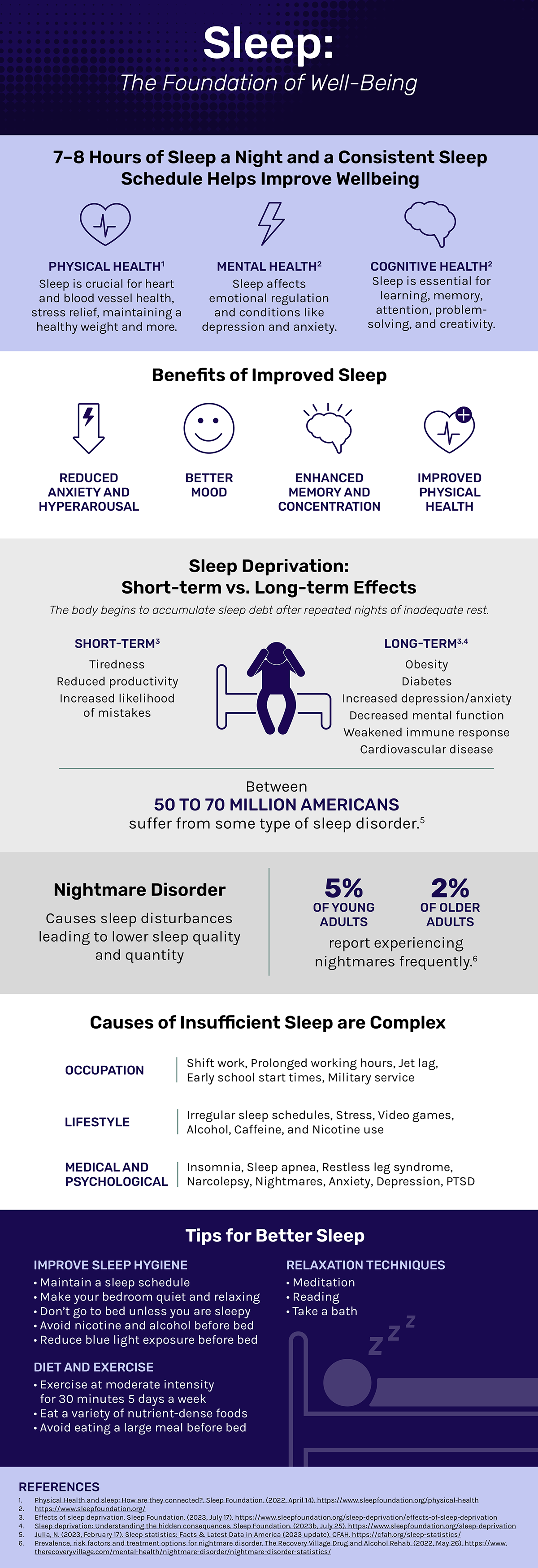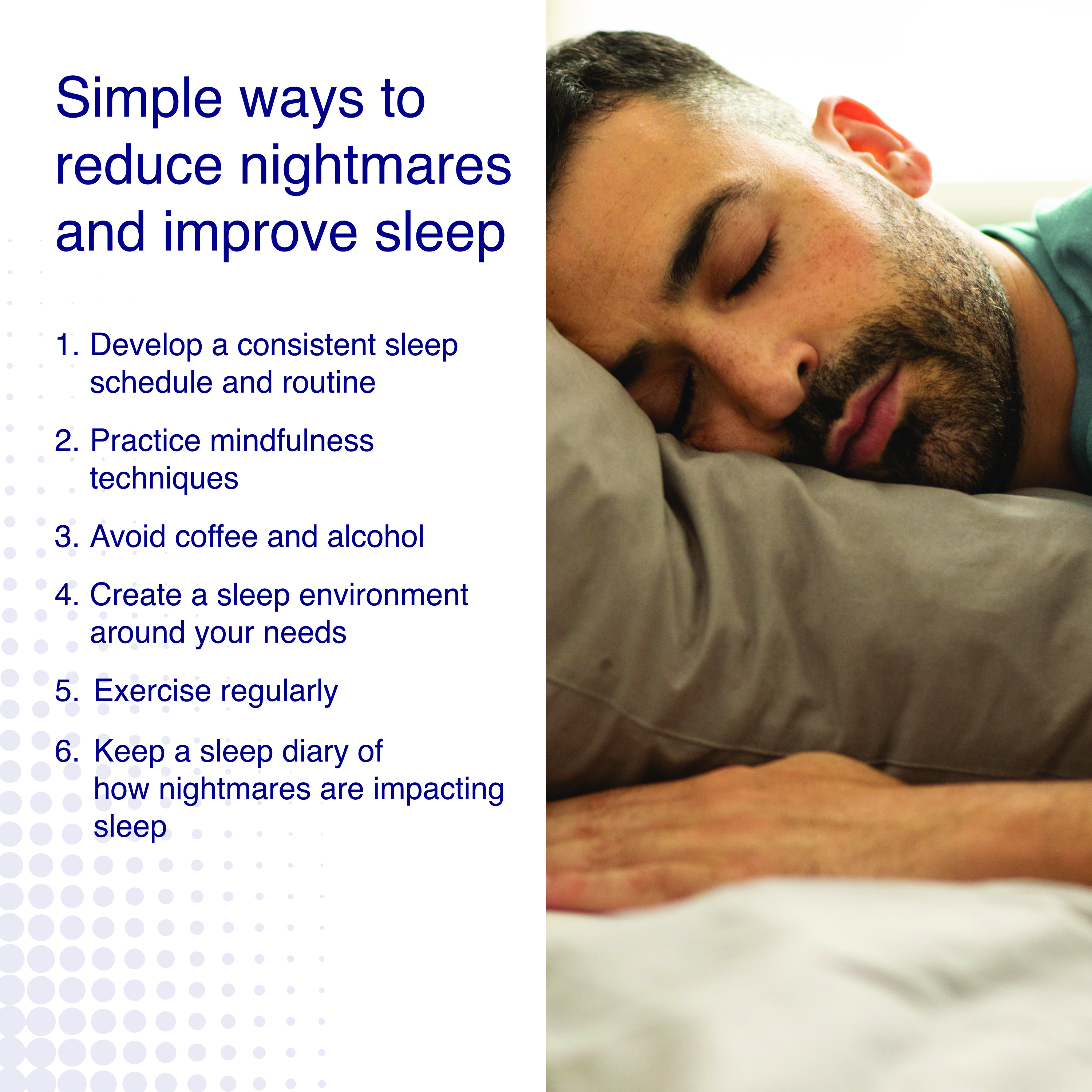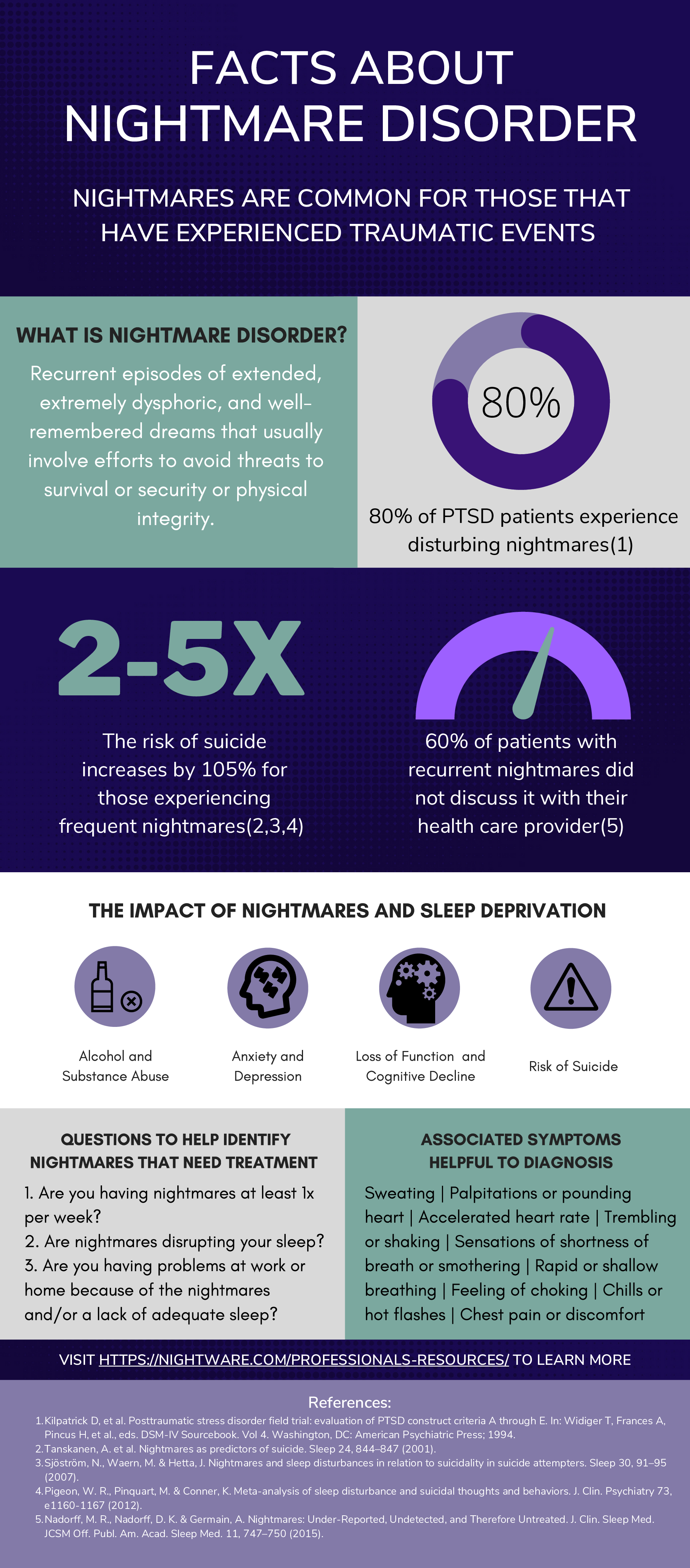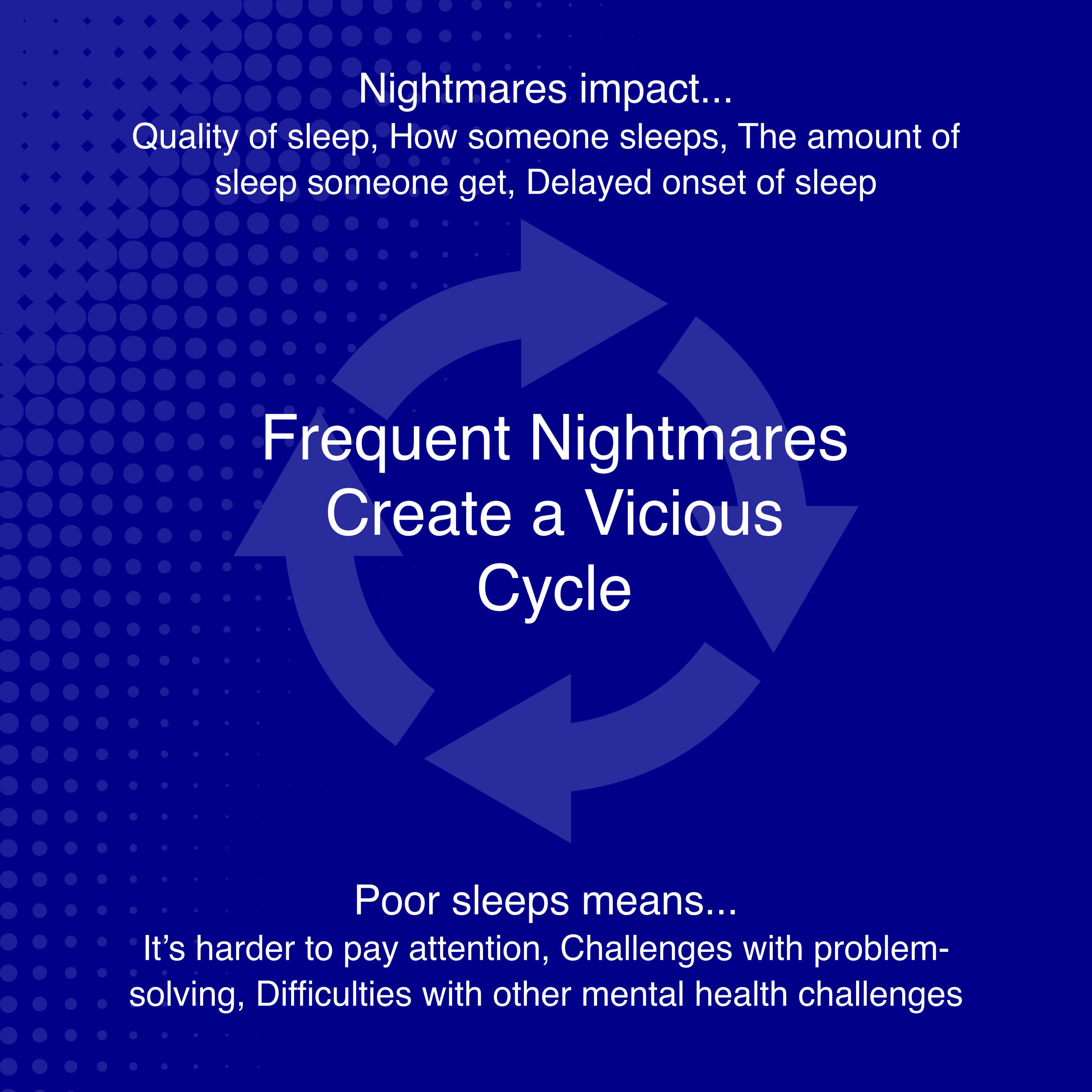How can I improve my sleep quality?
Nightmare Disorder Information
A place for patients and clinicians to gather resources.
General Information
Infographics
Impact of Nightmares

Summary of Infographic
- Nightmare Disorder is a condition that significantly impacts a large portion of the adult population, with up to 30% experiencing at least one nightmare monthly. Understanding the scope and impact of this disorder is crucial, as it not only affects sleep quality but also overall physical and mental health.
- Physically, chronic sleep deficiency, often a consequence of frequent nightmares, is linked to an increased risk of various health conditions. These include high blood pressure, heart disease, obesity, hormone imbalance, diabetes, and a weakened immune system. The strong association between inadequate sleep and these serious health issues underscores the importance of addressing and managing Nightmare Disorder.
- Mentally, the disorder can exacerbate symptoms of emotional imbalance, anxiety, depression, and even suicidal thoughts and behaviors. Nightmares often lead to intense feelings of fear, terror, and anxiety, causing insomnia and distress, which can persist into the daytime. This creates a vicious cycle, where the disruptive nature of nightmares intensifies the emotional distress they cause.
- The cognitive and social impacts of sleep deprivation due to nightmares are significant. Cognitive effects include poor concentration, decreased alertness, irritability, impaired judgment, reduced coordination, and emotional volatility. These can severely affect daily functioning, including work performance. Socially, the fatigue and emotional distress from nightmares can lead to increased irritability, conflicts, strained interactions, withdrawal from family activities, marital stress, and elevated stress levels within families.
- Nightmare Disorder thus emerges as a condition with far-reaching implications, affecting various aspects of an individual’s life. Recognizing the symptoms and seeking appropriate treatment is vital for those affected by this disorder. Effective management of the condition can lead to significant improvements in sleep quality and overall well-being.
Summary of Infographic
- Sleep is fundamental to our overall well-being, with 7-8 hours per night being the ideal amount for most adults. Consistent sleep schedules are also key to improving well-being. Sleep’s impact spans across physical, mental, and cognitive health, making it an essential aspect of daily life.
- Physically, sleep plays a crucial role in heart and blood vessel health, stress relief, and maintaining a healthy weight. Adequate rest helps reduce the risk of several health issues such as obesity, diabetes, cardiovascular diseases, and a weakened immune system. These benefits underscore the importance of sleep in maintaining overall physical health.
- From a mental health perspective, sleep significantly influences emotional regulation and can impact conditions like depression and anxiety. Improved sleep is associated with reduced anxiety and hyperarousal, leading to a better overall mood. This highlights the direct connection between sleep quality and mental well-being.
- In terms of cognitive health, sleep is essential for learning, memory, attention, problem-solving, and creativity. Enhanced sleep leads to improved memory and concentration, crucial for effective functioning in daily activities. The correlation between sleep and cognitive functions is a critical aspect of why adequate rest is so important.
- Sleep deprivation, both in the short and long term, has various effects. Short-term deprivation can lead to tiredness, reduced productivity, and an increased likelihood of mistakes. Long-term effects are more severe, including obesity, diabetes, increased depression and anxiety, decreased mental function, weakened immune response, and cardiovascular disease. It’s important to recognize these potential impacts of inadequate sleep on health and daily life.
- Interestingly, between 50 to 70 million Americans suffer from some type of sleep disorder. Causes of insufficient sleep are varied, encompassing factors such as occupation, lifestyle, and medical and psychological conditions. For better sleep, practices like improving sleep hygiene, following a healthy diet and exercise routine, and incorporating relaxation techniques such as meditation and reading are recommended.
- Understanding the comprehensive role of sleep in overall well-being is crucial. Adequate sleep is not just about preventing tiredness; it’s about fostering physical, mental, and cognitive health, and managing the risk of various health conditions. Prioritizing good sleep hygiene and addressing any sleep disorders are essential steps towards maintaining a healthy, balanced life.
Sleep: The Foundation of Well-Being

Understanding Sleep Disturbances

Summary of Infographic
- Understanding different sleep disturbances is crucial for those experiencing them or caring for someone who does. More than 80 distinct sleep disorders have been identified, each affecting sleep quality, timing, and duration in unique ways.
- Nightmare Disorder is characterized by frequent, distressing dreams that often lead to significant distress upon waking. These vivid, story-like nightmares can cause emotional distress and make it difficult to return to sleep. For many, especially those with PTSD, nightmares may involve reliving traumatic events. This can create a fear of sleep, leading to a disruptive cycle of disturbed sleep and daytime stress.
- Night Terrors, primarily occurring in children during NREM sleep, are episodes of intense fear, often accompanied by screaming, with little or no memory of the event upon waking. Unlike nightmares, they do not occur during the REM sleep stage and are usually not remembered. Understanding this distinction can be helpful in addressing and managing these episodes.
- Other conditions include sleepwalking, where individuals walk or perform complex behaviors while mostly asleep, and REM Sleep Behavior Disorder, which involves sudden body movements or vocalizations during vivid dreams. Sleep Paralysis, another condition, is characterized by a temporary inability to move or speak while falling asleep or upon waking.
- Each of these conditions affects individuals differently, and their impact can range from mild inconvenience to significant disruption of daily life. Recognizing and understanding these disorders is vital for seeking appropriate treatment and improving overall sleep health. For those affected, gaining knowledge about these conditions can empower them to seek help and improve their quality of life.
5 October, 2023
Nightmare Disorder Informative Video
Our animated video explains the effects of Nightmare Disorder in your daily life and how you can get treatment to improve your sleep quality.


